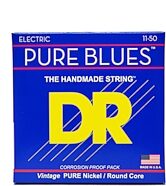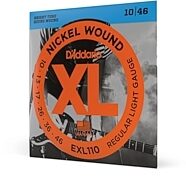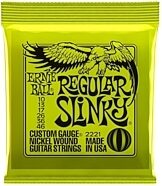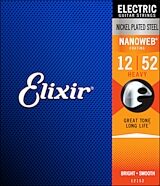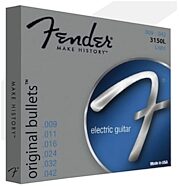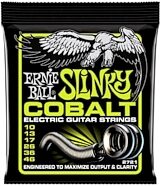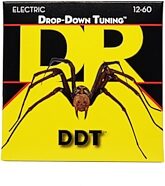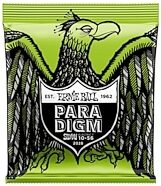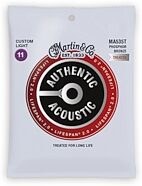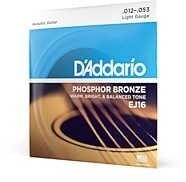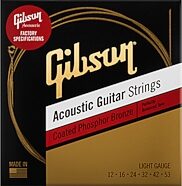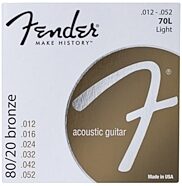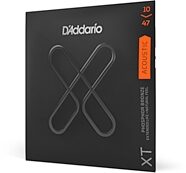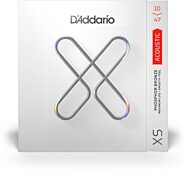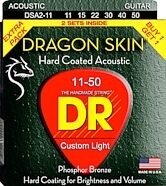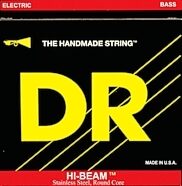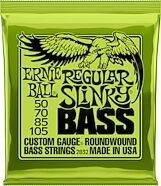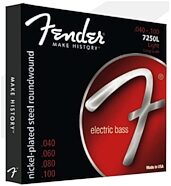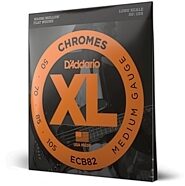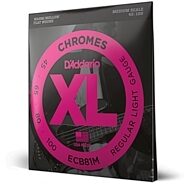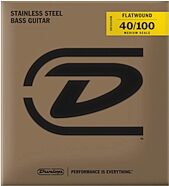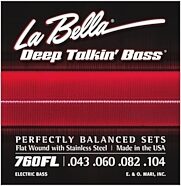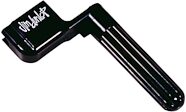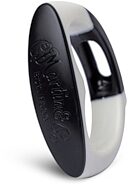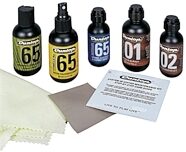Customer Kudos
"You put your trust in someone else's hands when ordering instruments online and zZounds has always come through. Every time I've ordered from zZounds it has been a great experience. Great instruments, great prices, great ppl and support and I always feel like I handpicked my instrument. Who could ask for more?"
March 20, 2024

Strings Buying Guide
For the new player, finding the right set of strings can be daunting. Between string gauges, the type of winding, what the strings are made of, and whether they're coated or not, there is a lot to consider, and it's easy to get tangled in the varieties.
To help sort this all out, we've put together this Strings Buying Guide. Our gear experts broke down the different types of electric, acoustic, and bass strings, explaining what to expect from each. There are examples for each category to start your search, and some excellent accessories at the end for when you're ready to wind up, whether that's with four, six, seven or 12 strings!
To help sort this all out, we've put together this Strings Buying Guide. Our gear experts broke down the different types of electric, acoustic, and bass strings, explaining what to expect from each. There are examples for each category to start your search, and some excellent accessories at the end for when you're ready to wind up, whether that's with four, six, seven or 12 strings!
Electric Guitar Strings
Your tone starts in your hands, but its next stop? It's not your guitar's wood or pickups, but your strings. Just like tonewoods color the sound, string alloys will react differently with the pickups and provide a different feel.
Pure nickel strings have a soft attack that blooms and will mellow the sound of single-coil pickups. Their tone leans toward vintage and they tend to soften highs and mids, for a sound that's less hot than nickel-plated and steel.
Nickel-plated/steel-core strings are the most common variety, due in part to their easy-on-the-fingers feel. Their tone is balanced between bright steel-core and mellow nickel.
Stainless steel strings are very bright and full of sustain. Compared to other varieties, steel strings have a longer life with less corrosion and loud output, but a somewhat coarse feel.
Cobalt strings bring a quick attack to notes, with very bright treble and a focused midrange boost. They boast the loudest output because of their magnetism.
Coated strings prevent gunk and grime buildup, helping to extend string life. Depending on the manufacturer, strings may be entirely coated, or just have their inner portion coated.
Pure nickel strings have a soft attack that blooms and will mellow the sound of single-coil pickups. Their tone leans toward vintage and they tend to soften highs and mids, for a sound that's less hot than nickel-plated and steel.
Nickel-plated/steel-core strings are the most common variety, due in part to their easy-on-the-fingers feel. Their tone is balanced between bright steel-core and mellow nickel.
Stainless steel strings are very bright and full of sustain. Compared to other varieties, steel strings have a longer life with less corrosion and loud output, but a somewhat coarse feel.
Cobalt strings bring a quick attack to notes, with very bright treble and a focused midrange boost. They boast the loudest output because of their magnetism.
Coated strings prevent gunk and grime buildup, helping to extend string life. Depending on the manufacturer, strings may be entirely coated, or just have their inner portion coated.
Choosing the Right Gauge
Looking for heavy strings that stand up to your chugging, scorched-earth riffage? Or do you need slim strings that will bend with ease for liquid-smooth soloing? Choosing the right gauge, or thickness of strings, will make all the difference in your playing.
Light gauge strings offer easier playability and fretting, and can in some cases be more tonally balanced. Lighter gauge string sets are often recommended for beginners or those that desire the easiest playing experience. The lightest gauge strings most manufacturers offer go from a .009" first string to a .042" sixth string.
Heavier gauge strings typically offer greater output (especially on the low end), and are usually favored for metal and heavier music. Thicker gauges also create more tension, which keeps them sounding articulate in drop tunings, but can require more effort to bend. String sets considered "heavy" typically run from a .012" first string to a ".052 (or thicker) sixth string.
Each manufacturer's string sets are different, so it's important to consider several options. There are also plenty of medium gauge and hybrid sets that pair light treble strings and thicker bass strings for great comfort and output.
Light gauge strings offer easier playability and fretting, and can in some cases be more tonally balanced. Lighter gauge string sets are often recommended for beginners or those that desire the easiest playing experience. The lightest gauge strings most manufacturers offer go from a .009" first string to a .042" sixth string.
Heavier gauge strings typically offer greater output (especially on the low end), and are usually favored for metal and heavier music. Thicker gauges also create more tension, which keeps them sounding articulate in drop tunings, but can require more effort to bend. String sets considered "heavy" typically run from a .012" first string to a ".052 (or thicker) sixth string.
Each manufacturer's string sets are different, so it's important to consider several options. There are also plenty of medium gauge and hybrid sets that pair light treble strings and thicker bass strings for great comfort and output.
Acoustic Guitar Strings - All About Alloys
With so few elements available to shape an acoustic guitar's tone, string choice is incredibly important. Whether you want to complement or balance out your guitar's natural sound from its tonewoods, make sure you find the right string alloy to nail that singing tone.
80/20 Bronze strings are a popular choice for their bright tone, thanks to the 80% bronze/20% tin composition of their wrap wire. The cost of this tone is a relatively short life, however, as 80/20 strings generally corrode faster than other alloys.
Phosphor Bronze strings have a wrap wire made of a 92% copper/8% tin alloy, and get their name from phosphorous content in the tin. Phosphor bronze strings sound mellow compared to 80/20 strings, but retain their tone and resist corrosion longer.
80/20 Bronze strings are a popular choice for their bright tone, thanks to the 80% bronze/20% tin composition of their wrap wire. The cost of this tone is a relatively short life, however, as 80/20 strings generally corrode faster than other alloys.
Phosphor Bronze strings have a wrap wire made of a 92% copper/8% tin alloy, and get their name from phosphorous content in the tin. Phosphor bronze strings sound mellow compared to 80/20 strings, but retain their tone and resist corrosion longer.
To Coat or Not to Coat?
Love the 80/20 bronze sound, but wish it could last longer? Coated acoustic strings help retain the clarity, top-end tone, and general life of your strings for much longer stretches. They feature a polymer coating across the wound strings that slows corrosion by protecting against oxidation and acids from fingers.
Some players say the benefits of coating come at the cost of slippery-feeling strings and altered tone due to the string's increased mass. Coating thickness and composition varies between manufacturers, however, so it's important to compare before purchasing.
Some players say the benefits of coating come at the cost of slippery-feeling strings and altered tone due to the string's increased mass. Coating thickness and composition varies between manufacturers, however, so it's important to compare before purchasing.
Roundwound Bass Strings
The standard for bass guitars, roundwound strings are used for all techniques: slapping, tapping, fingerstyle, or playing with a pick. The name refers to the rounded edges of the wrap wire, which create ridges along the string's surface and improve traction. Even now that the bass has been liberated from the limitations of 4 strings, players can find 5, 6, and even 8-string roundwound sets of all varieties and materials, including those for acoustic bass.
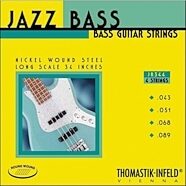
Flatwound Bass Strings
The electric bass guitar owes its heritage to the upright bass, and flatwound strings are one of the best ways to get the thump and vintage character of an upright on your modern bass. Their wrap wire lays flat around the strings, producing no grooves, for a smooth feel that's great for sliding. Flatwound strings pair especially well with fretless basses, helping to prevent fretboard wear and producing a more traditional upright sound.
String Accessories
So you've just picked up a pack of fresh new strings and can't wait to get them on and start ripping out licks. If you've got the right set of tools on hand, you'll be able to wind that set up quickly and neatly.
A string winder is a simple, must-have tool that makes winding up new strings a breeze. Once you've tuned up your strings, use a string cutter to snap off the pesky remaining ends. Finally, lubricating your strings once they're broken in will keep them feeling fresh and give you a silky smooth fretboard to play on.
A string winder is a simple, must-have tool that makes winding up new strings a breeze. Once you've tuned up your strings, use a string cutter to snap off the pesky remaining ends. Finally, lubricating your strings once they're broken in will keep them feeling fresh and give you a silky smooth fretboard to play on.
